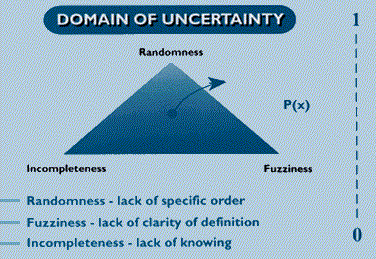



Juniper Programme Update
PSTIís Juniper Programme on managing
reservoir uncertainty continues to make good progress. The primary
aim of the programme is to address uncertainty as it impinges
upon the way reservoir management decisions are made, and how
appropriate actions are identified, planned and executed.
As part of the Juniper Programme a workshop
was held during April in Bristol on Handling Reservoir Uncertainty.
A total of 50 industry representatives from 21 PSTI Member companies,
together with programme consultants and researchers, attended
the two-day meeting. The primary aim of the event was to report
progress to date.
The workshop presented the approach developed
at Bristol and Aberdeen Universities of describing reservoir appraisal
and development as hierarchical processes. The main focus was
how uncertainty propagates through the hierarchy. Uncertainty
has three distinct components: fuzziness, incompleteness and randomness.
These components need to be handled by distinct techniques. The
workshop demonstrated how interval probability theory can be used
to manage incompleteness and randomness, and how fuzziness is
managed through the positioning of the concept or sub-process
within the process hierarchy.

Determination of top structure and oil water
contact were the problems addressed to illustrate the management
of uncertainty. The problems were sufficiently complex to show
how uncertainty propagates, and how interval probability theory
can handle incompleteness (an open world approach) as well as
problems of dependency.
The workshop also included presentations
from industry representatives on uncertainty management, particularly
the use of geostatistics. In addition, current issues relating
to uncertainty theory in the USA together with the future of uncertainty
computer modelling were addressed.
In the final session, the future direction
of the Juniper Programme and related joint industry projects was
considered. It was agreed that the methodologies developed should
be applied to real, high level decision making examples where
there is a genuine choice to be made. Subsequent to the workshop,
the Steering Committee approved focusing future work on a 'live'
example provided by one of PSTIís member companies. An
extended reach well into an untested structure from an existing
platform is planned and the uncertainty associated with the decisions
made will be studied.
For further information contact Alistair
Fletcher, e-mail: [email protected] Tel: 0117 928 9117.
Fax: 0117 927 7203.



